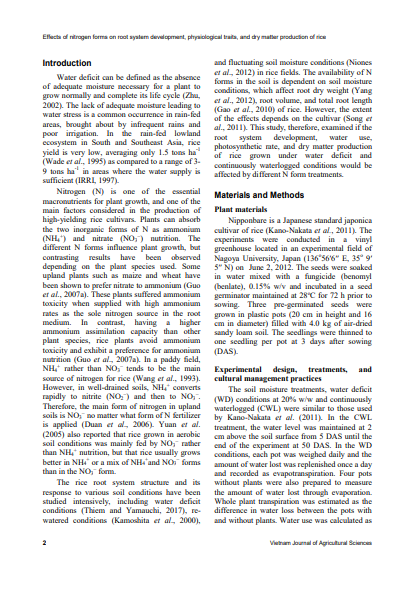Who cares more about the environment?: An empirical study in Vietnam
1Faculty of Natural Resources and Environment, Vietnam National University of Agriculture, Hanoi 131000, Vietnam
Main Article Content
Abstract
Environmental problems have become one of the top concerns in Vietnam since 2016. This study aimed to investigate what groups of people were most concerned about the environment and to what extent their concerns differed from each other. Logistic regression models were used to perform the analyses. The analysis on the gender - environmental concern relationship indicated that males were more likely to be concerned about the environment than females. The age - environmental concern relationship suggested higher concern levels of younger people as compared to older people. In the examination of the social class - environmental concern relationship, people who were wealthier, well-educated, and had greater occupational prestige tended to have more concerns. People with higher education levels also expressed higher levels of concern toward the environment. People with postgraduate degrees reported the highest level of concern, while people with no formal education showed the least concern. From the perspective of the political involvement - environmental concern relationship, it was shown that while people who were not a member of any organization were the least environmentally concerned, the members of university alumni associations were the most concerned. Finally, the exploration of the residence - environmental concern relationship pointed out that Kinh people were more environmentally concerned than Vietnamese ethnic minority groups, and people in the North Central Coast paid the highest attention to the environment in Vietnam.
Article Details
References
-
Arbuthnot J. & Lingg S. (1975). A comparison of French and American environmental behaviors, knowledge, and attitudes. International Journal of Psychology. 10(4): 275-281.
Arcury T. (1990). Environmental attitude and environmental knowledge. Human Organization. 49(4): 300-304.
Arcury T. A., Johnson T. P. & Scollay S. J. (1986). Ecological worldview and environmental knowledge: The “new environmental paradigm.” The Journal of Environmental Education. 17(4): 3540.
Arcury T. A., Scollay S. J. & Johnson T. P. (1987). Sex differences in environmental concern and knowledge: The case of acid rain. Sex Roles. 16(9-10): 463-472.
Buttel F. H. (1987). New directions in environmental sociology. Annual Review of Sociology. 13(1): 465-488.
Buttel F. H. & Flinn W. L. (1974). The structure of support for the environmental movement, 1968-1970. Rural Sociology. 39(1): 56.
Catton Jr W. R. & Dunlap R. E. (1978). Environmental sociology: A new paradigm. The American Sociologist, 41-49.
CECODES, VFF-CRT & UNDP (2016). The Vietnam Provincial Governance and Public Administration Performance Index (PAPI) 2015: Measuring citizen’s experiences. A Joint Policy Research Paper by Centre for Community Support and Development Studies (CECODES), Centre for Research and Training of the Viet Nam Fatherland Front (VFF-CRT), and United Nations Development Programme (UNDP). Retrieved from http://papi.org.vn/eng/wp-content/uploads/2016/04/PAPI-2015_REPORT_ENGLISH-1.pdf on December 7, 2016.
CECODES, VFF-CRT & UNDP (2017). The Vietnam Provincial Governance and Public Administration Performance Index (PAPI) 2016: Measuring citizen’s experiences. A Joint Policy Research Paper by Centre for Community Support and Development Studies (CECODES), Centre for Research and Training of the Viet Nam Fatherland Front (VFF-CRT), and United Nations Development Programme (UNDP). Retrieved from http://papi.org.vn/eng/wp-content/uploads/2017/04/PAPI2016_Report_Final_ENG-1.pdf on September 8, 2019.
Davidson D. J. & Freudenburg W. R. (1996). Gender and environmental risk concerns: A review and analysis of available research. Environment and Behavior. 28(3): 302-339.
Dunlap R. E. (1975). The impact of political orientation on environmental attitudes and actions. Environment and Behavior. 7(4): 428-454.
Dunlap R. E. & Catton Jr W. R. (1979). Environmental sociology. Annual Review of Sociology. 5(1): 243-273.
IBRD (1992). World Development Report 1992: Development and the Environment. Oxford University Press.
Institute for Social Development Studies (2015). Social determinants of gender inequality in Vietnam. Retrieved from https://vietnam.embassy.gov.au/files/hnoi/ISDS_Report_Binh%20dang%20gioi_EN_PDF-2.pdf on September 15, 2021.
Liere K. D. V. & Dunlap R. E. (1980). The social bases of environmental concern: A review of hypotheses, explanations and empirical evidence. Public Opinion Quarterly. 44(2): 181-197.
Malkis A. & Grasmick H. G. (1977). Support for the ideology of the environmental movement: Tests of alternative hypotheses. Western Sociological Review. 8(1): 25-47.
Martinson O. B. & Wilkening E. A. (1975). A scale to measure awareness of environmental problems: Structure and correlates. Annual Meeting of the Midwest Sociological Society. Chicago. IL: Midwest Sociological Society.
Maslow A. (1970). Motivation and Personality: Second Edition (Second edition). Harper & Row.
McEvoy J. (1972). The American concern with the environment. Social Behavior, Natural Resources and the Environment: 214-236.
MONRE (2014). National environmental report 2013 – Air environment (National Environmental Report No. 31-2014/CXB/19-915/BD) (in Vietnamese).
MONRE, RRC.AP, IGES & NIES (2012). Vietnam National Environmental Performance Assessment (EPA) Report.
Morrison D. E., Hornback K. E. & Warner W. K. (1972). The environmental movement: Some preliminary observations and predictions. Social Behavior, Natural Resources and the Environment: 259-279.
Murdock S. H. & Schriner E. C. (1977). Social and Economic Determinants of the Level of Support for Environmental Protection and Economic Growth in a Rural Population
Nguyen M. (2017). Formosa steel plant in Vietnam restarts after toxic spill. etrieved from https://www.reuters.com/article/us-vietnam-environment-formosa-plastics/formosa-steel-plant-in-vietnam-restarts-after-toxic-spill-idUSKBN18P186 on September 8, 2019.
Sands G. (2016). Vietnam’s Growing Environmental Activism | The Diplomat. Retrieved from https://thediplomat.com/2016/10/vietnams-growing-environmental-activism/ on March 3, 2020.
Teerawichitchainan B., Knodel J., Loi V. M. & Huy V. T. (2010). The Gender Division of Household Labor in Vietnam: Cohort Trends and Regional Variations. Journal of Comparative Family Studies. 41(1): 57-85. JSTOR.
Tran C. C., Ta T. D., Duong A. T., Phan O. T. & Nguyen D. A. (2020). Analysis on Temporal Pattern of Fine Particulate Matter (PM 2.5) in Hanoi, Vietnam and the Impact of Meteorological Conditions. Journal of Environmental Protection. 11(3): 246.
Tremblay K. R. & Dunlap R. E. (1978). Rural-urban residence and concern with environmental quality: A replication and extension. Rural Sociology. 43(3): 474.
Van Liere K. & Dunlap R. (1978). Environmental Concern: Consistency Among its Dimensions, Conceptualisations and Empirical Correlates. Annual Meeting of the Pacific Sociological Association, Spokane, Washington.
Verbeek M. (2008). A Guide to Modern Econometrics (3rd ed.). John Wiley & Sons.

